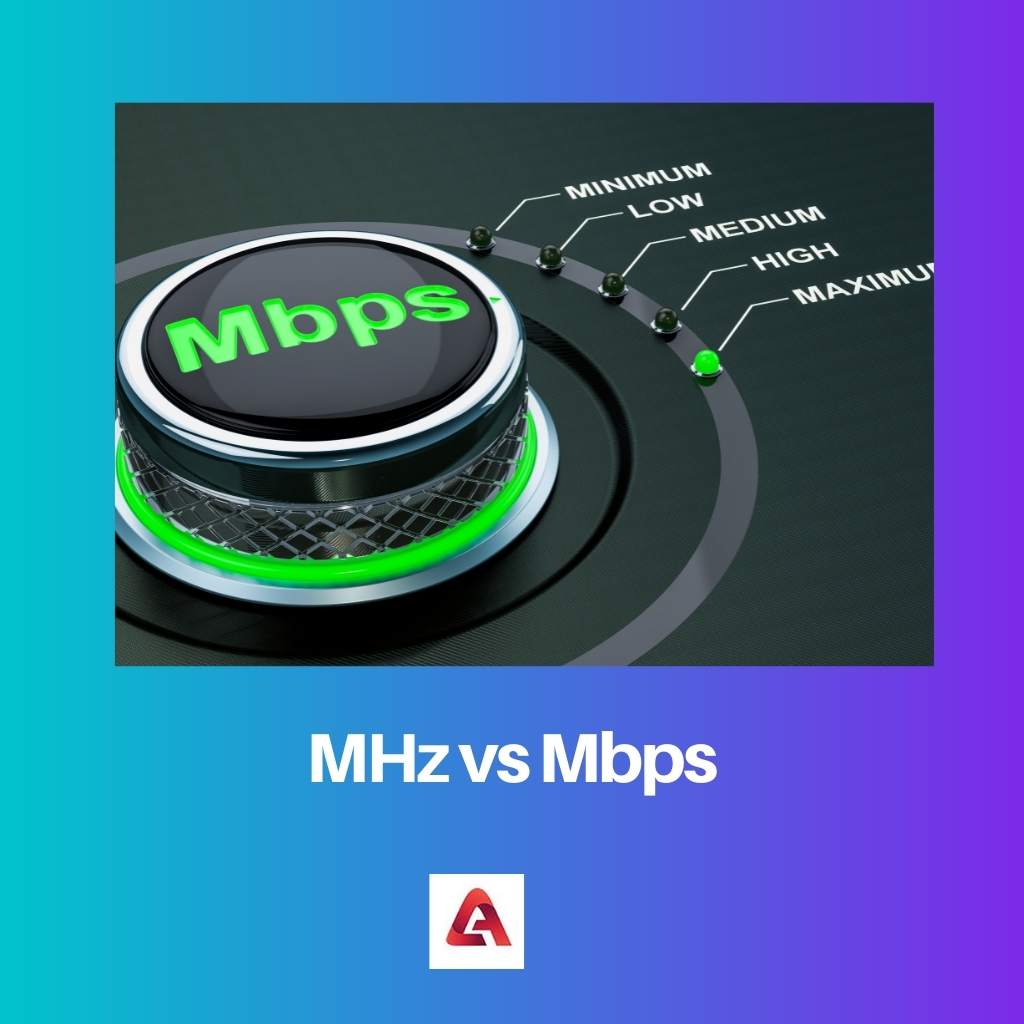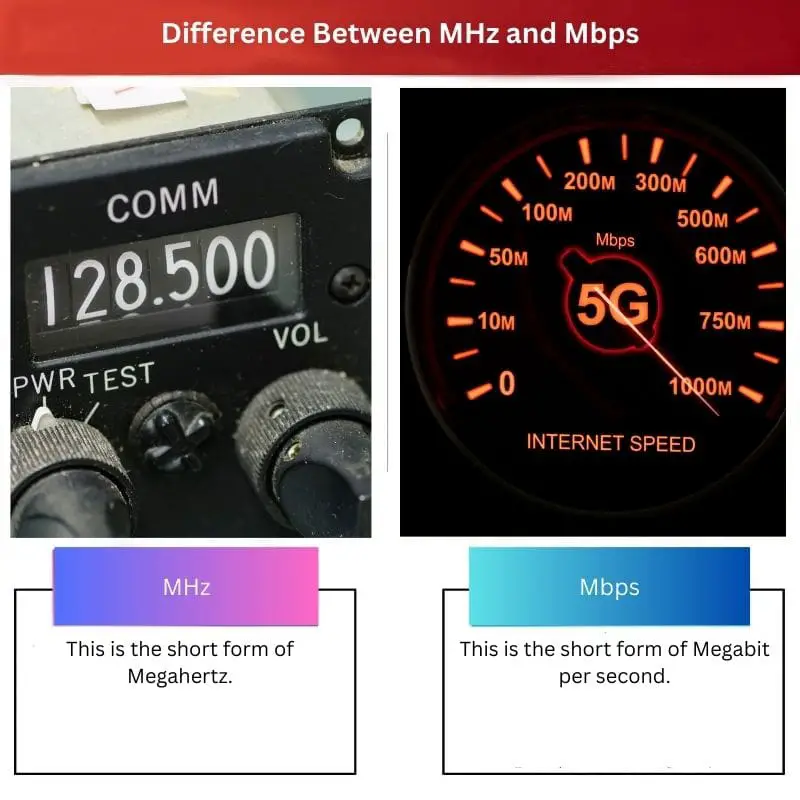In the world of different kinds of Transmissions, people who are known to these transmissions will be really well versed with the terms MHz and Mbps.
People are very known with these topics as they are literally related to computers and logs. The terms MHz and Mbps are not at all related to each other.
Key Takeaways
- MHz refers to the frequency of a signal measured in millions of cycles per second, while Mbps refers to the data transfer rate in millions of bits per second.
- MHz is used to measure the clock speed of a computer’s processor, while Mbps is used to measure the speed of data transmission over a network.
- MHz and Mbps are not interchangeable, as they measure different things, but both are important in determining a computer’s or network’s performance.
MHz vs Mbps
MHz (Megahertz) is a unit which is used for the measurement of frequency. The term ‘MHz’ is also used in computers. The speed of the CPU can be measured through this unit. Mbps (Megabit per second) is a unit used to measure the data transferred in the form of packets. It can also be used to measure internet connection speed.

MHz is a term that is referred to as the megahertz. This is used for measuring different frequencies in different objects. Frequencies actually mean the measure of the amount of wavelength produced in an object which would travel each second.
This term is widely used in science and technology, and almost many people are well-known about the topic.
Mbps is a term that is referred to as megabits per second. This term is useful for defining the Speed data that is being backed or is already packed. This data is the one that is used for transferring from one network line to the other. One megabit is equal to 1,000,00 bits.
Comparison Table
| Parameters of Comparison | MHz | Mbps |
|---|---|---|
| Full forms | This is the short form of Megahertz. | This is the short form of Megabit per second. |
| Meaning | This is a unit that is used for measuring frequencies. | This is a unit that is used for measuring the number of data packs transferred in a server. |
| Standard characteristic | One megahertz is equivalent to 10^6 hertz. | One Megabit is equivalent to 10^6 or 1,000,00 bits. |
| Basic feature | This is basically the rate of frequency at which the wavelength travels. | This is the helping unit that is used to denote the transmission of packed data. |
| Main function | This is used for denoting the speed of the Central processing unit in a computer. | This is used for denoting the speed of the internet connection in the computer. |
What is MHz?
MHz is a term that is referred to as the megahertz. This is used for measuring different frequencies in different objects. Frequencies actually mean the measure of the amount of wavelength produced in an object which would travel each second.
This term is widely used in science and technology, and almost many people are well-known about the topic.
The standard formula of frequency is the frequency is equal to the amount of velocity in which the wave travels in the wavelength of a particular wave. Hz is the short form of hertz, which is the unit of frequency. It is denoted as being referred to as one megahertz is equal to 10^6 hertz.
Although the term MHz is correlated to wavelengths, it is more even used in computer processing terms.
This helps I’m operating frequencies for the core of central processing units. In a CPU, the higher the rate of frequencies, the higher will be the working of the processor. This helps to define the number of instructions that the CPU can process.

What is Mbps?
Mbps is a term that is referred to as megabits per second. This term is useful for defining the Speed data that is being backed or is already packed. This data is the one that is used for transferring from one network line to the other. One megabit is equal to 1,000,00 bits.
Unlike how a frequency travels, the travelling of data is only digital and not analogue. Data that is in digital form is collected from one server to another on a computer. This type of conversion occurs in data due to a modulator or a demodulator, also widely known as a modem.
When a person gets access to the net, he or she thinks about the speed of the net they receive. Hence, this speed of the net is more or less dependent upon packets of data that are transferred per unit of time.
A standard internet speed normally works, even with 50 kbps. An Mbps is considered similar to the term Mbps which is not the case in actuality. Since Mbps is a megabit and MBps is a megabyte.

Main Differences Between MHz and Mbps
- MHz is the short form of Megahertz, and on the other hand, Mbps is the short form of Megabit per second.
- A unit used for measuring frequencies is known to be called MHz, which is the megahertz, and on the other hand, the unit used for measuring the number of data packs transferred in a server is known to be called Mbps, which is the megabit per second.
- In MHz, one megahertz is equivalent to 10^6 hertz, while in Mbps, one Megabit is equivalent to 10^6 or 1,000,00 bits.
- The MHz is used to denote the speed of the Central processing unit in a computer, and on the other hand, the Mbps is used to denote the speed of the internet connection in the computer.
- The MHz is basically the rate of frequency at which the wavelength travels, and on the other hand, the Mbps is the helping unit that is used to denote the transmission of packed data.

- https://dl.acm.org/doi/abs/10.1145/1095810.1118605
- https://ieeexplore.ieee.org/abstract/document/4580180/

The article’s delineation of MHz and Mbps is a valuable resource for professionals and enthusiasts in the computer science and networking domains. It expounds upon these fundamental units with remarkable clarity.
Absolutely, Hill Mary. The article enhances our understanding of these key parameters and their significance in the digital realm.
Indeed, Hill Mary. The exposition of MHz and Mbps exemplifies scholarly rigor in elucidating these technical units.
Fascinating insights! These comments on MHz and Mbps have provided me with a clearer understanding of the technical aspects of computing and data transmission.
Absolutely, Jack94. Understanding the technicalities of these units enhances our appreciation for the inner workings of computer systems.
Indeed, Jack94. The article effectively demystifies these technical concepts in a comprehensible manner.
The difference between MHz and Mbps is crucial in understanding the performance of a computer or network. MHz measures the frequency of a signal, while Mbps measures the data transfer rate. Both are fundamental to get the best performance.
Absolutely right, Smith Imogen. This knowledge is essential for anyone working with computers or networking.
It’s fascinating how the technical aspects of computing and networking are so interconnected. Understanding these units helps us appreciate the complexity of these systems.
MHz and Mbps play distinct but vital roles in the performance of processors and data transmission. This article provides a clear and concise explanation of the differences between these units.
Absolutely, Young Megan. It’s crucial for those in the field to have a deep understanding of these key metrics.
The differentiation between MHz and Mbps set forth in the article is insightful and holds paramount importance for professionals dealing with computer hardware and network infrastructure.
You’re absolutely right, Hmurray. This knowledge is indispensable in the domain of computer science and networking.
The detailed comparison provided in the article is enlightening and serves as an excellent reference for professionals working with computer systems and networking.
Absolutely, Ross Arthur. The comparative analysis of these units is an asset to anyone in the field of computing.
Rightly said, Ross Arthur. This clarity on MHz and Mbps is invaluable for those seeking to optimize the performance of their systems.
The lucid explication of MHz and Mbps is indispensable for professionals who seek to unravel the technical complexities of computer systems and network infrastructure.
I concur, Hollie62. The article delivers insights that foster a deeper comprehension of these critical concepts.
The elucidation of MHz and Mbps is essential for professionals engaged in the spheres of digital technology and communication networks. This article offers valuable insights into these fundamental concepts.
Rightly said, Phillips Alan. The elucidation of MHz and Mbps in the article contributes significantly to the technical knowledge base of the readers.
Absolutely, Phillips Alan. It’s a must-read for individuals involved in computer engineering and telecommunications.
The comprehensive explanation of MHz and Mbps is invaluable for those seeking to delve into the intricacies of data processing and network operations.
I couldn’t agree more, Jasmine Holmes. The article provides a robust foundation for understanding these critical concepts.
The article serves as a valuable reference for individuals engaged in the domains of computing and networking.